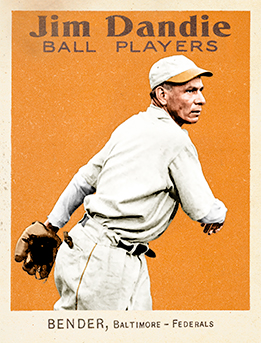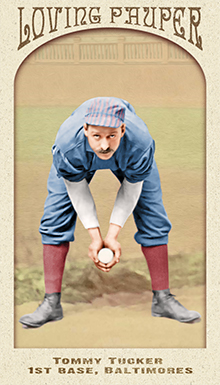
- Series: 1880s: Loving Paupers
- City: Baltimore
- Team: Orioles
- League: American Association
Thomas Joseph Tucker (1863-1935) played first base for six MLB teams from 1887 through the 1899 season. He learned the game in and around his native Holyoke, Massachusetts, coming up in the era when gloves were small to nonexistent. At age 20 he signed on with his local minor league club and stayed in New England until the American Association’s Baltimore Orioles gave him his shot in the big leagues. He was a regular immediately and stayed three years, during which Tommy batted .275 and .287 before finishing with a spectacular .372 in 1889. That led to a job with the Beaneaters in Boston where he proved a worthy successor to famed Dan Brouthers. In his seven full seasons in Boston, Tucker never again attained such a lofty average, but he was a consistently good solid hitter, exceeding .300 three times. In ‘97, the Senators purchased Tucker from the Beaneaters for $2,000 and he rewarded the club with a .338 average in his lone season in the Capital City. He split the ‘98 campaign between Brooklyn and St. Louis before closing out his career in the majors with the Cleveland Spiders. Despite tailing off at the plate after leaving Washington, the switch-hitting righty compiled a very fine .290 average overall.
Tucker was known as a tough & rowdy competitor, earning him colorful nicknames such as Noisy and Foghorn Tom.
- Tucker’s career-year in 1889 was remarkable for at least two reasons: He led the league that season and his .372 average still stands as the highest ever achieved by a switch-hitter
- Tommy tied a major league record on July 22, 1893 with four doubles and also had a perfect 6-for-6 game in 1897
- Tommy was hit-by-pitch more often than all but two players. Only Hughie Jennings and Craig Biggio exceeded his 272 career plunks
- After retiring from the majors, Tucker returned to New England and played for three minor league clubs through the 1902 season
- Bill James ranked Tucker as the 93rd greatest 1st baseman of all-time in 2001; Jay Jaffe's JAWS system ranks him today as the 108th best all-time (betwixt Ripper Collins and Charlie Hickman)
Auction History
Cartophilia
Old Judge Pose: 465-1
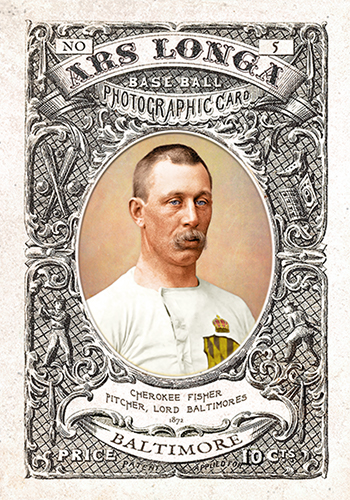
- Series: Mort's Reserve
- City: Baltimore
- Team: Canaries
- League: National Association (NAPBBP)
William Charles Fisher (1844-1912) was an erratic pitcher in baseball’s earliest days. He set some records with his renowned fastball but ended his career with far more losses than wins (56-84). Fisher toiled for so many clubs in the sport's beginnings that his resume reads like a catalog of the founding franchises. In the amateur days of the late 1860s, Cherokee threw for the West Philadelphias, the Cincinnati Buckeyes, the Troy Haymakers and the Chicago Dreadnaughts. As baseball turned pro, Fisher made the rounds, first with the Rockford Forest Citys in 1871 and then with such noteworthy teams as the Baltimore Canaries, Philladelphia Athletics and White Stockings, Hartford Dark Blues, Cincinnati Reds and Providence Grays. He posted the National Association’s best ERA in ‘72, 1.80, with Baltimore. Another less illustrious moment came with Chicago’s White Stockings in 1876, the first season for the new National League, when Cherokee surrendered the first home run in league history to Ross Barnes. Despite his mediocre win/loss record, Fisher ended his career with a fine 2.61 ERA. His finale came with Providence in ‘78 where his dismal 4-21 record ushered him out of the big leagues. Even then he managed a 3.06 ERA. It has been asserted that Fisher struggled throughout his tenure in baseball with a severe drinking problem. While that was a common affliction in his day, his history indicates he wasn’t out of control as he served for many years with the Chicago Fire Department following his major league days. Fisher’s peripatetic ways have been cited as a product of his alcoholism, but players were chattel in those days and clubs could and did ship even good players around arbitrarily.
- Fisher was 10-1 with Baltimore for his best winning percentage. His most wins came with Philadelphia in 1875 when he won 22 while losing 19. This was also the only other season he posted a winning record
- A quote concerning Fisher’s victory over New Haven in May of 1875 is a reminder of the far different conditions that prevailed in the early days: “Fisher’s pitching seemed to bother the New Haveners some, and foul outs and outs on strikes were frequent” per the New Haven Register
- Series: Jim Dandie Feds
- City: Baltimore
- Team: Terrapins
- League: Federal League
- Hall: National Baseball Hall of Fame
Charles Albert Bender (1884-1954) won 212 games en route to a Hall of Fame career. He began life amid the abject poverty of a Minnesota reservation, was mentored by Pop Warner at the Carlisle Indian School and hit the majors with a bang for the Athletics in 1903. “Albert” as Connie Mack called him, beat future Hall members Cy Young and Clark Griffith compiling 17 wins in his rookie season. He led the league 3x in win percentage but was at his best under pressure. In 5 World Series, Bender won 6 games with a 2.44 ERA and completed 9 of his 10 starts.
- Connie Mack said that of all his players he would most trust Bender to win in the clutch
- Admired for his brilliance, Ty Cobb dubbed him the most intelligent pitcher he ever faced
- Elected to Hall of Fame: 1953
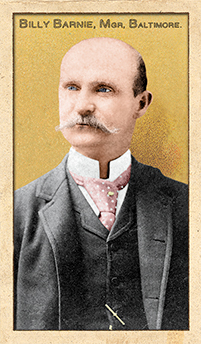
- Series: Beginnings: 1880's
- City: Baltimore
- Team: Orioles
- League: American Association
William Harrison Barnie (1853-1900) played catcher/OF for three National Association teams in the 1870s prior to beginning an extensive career as manager. Nicknamed “Bald Billy,” Barnie struck a distinguished pose for the Old Judge photographer during his days with the Orioles, the club he led for nine years. Billy left Baltimore following the 1891 season for a very brief turn with the Senators before managing Louisville and Brooklyn for two years each. Barnie’s frail health felled him a mere two years after his final campaign with the Bridegrooms, dying of pneumonia at age 47.
- While Mike Scanlon was desperately trying to gain major-league status for his Washington Statesmen in 1885, he publicly engaged Barnie in war of words seeking a contest with the Orioles to prove his team’s mettle. When the match finally occurred, following a wearisome Baltimore road trip, the D.C. lads prevailed 3-2 on May 28. The following year, Scanlon brought his squad into the NL
- Barnie was a lifelong partisan of the American Association, working hard to reconstitute it. He was mourned as a beloved man who would have had a big impact as the AL was forming
Auction History
Cartophilia
Old Judge Pose: 21-1
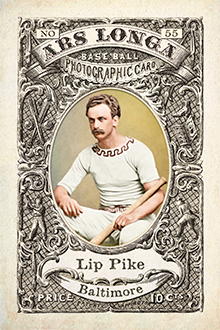
- Series: Pioneer Portraits I: 1850-1874
- City: Baltimore
- Team: Canaries
- League: National Association (NAPBBP)
Lipman Emanuel Pike (1845-1893) has many claims to fame as one of the most prodigious power hitters of early baseball. He was one of the first to be paid to play, he was a perennial field general on some of the best teams of his era, he hit some of the longest home runs in the earliest parks, he was one of the first players blacklisted, he was one of the fastest players of his time. And, if not the first, he was certainly the first Jewish player of note in the game. Pike came up in the infancy of baseball and starred for the great early clubs: The Brooklyn Atlantics, Philadelphia Athletics, NY Mutuals and the Irvington NJ nine. A solid all-around player, the southpaw even held his own at second and short. Movie-idol handsome, Lip always made his team look good. And he made a lot of teams look good. A lifelong itchy foot led Pike to change clubs as often as some players changed spikes. He never lasted more than two seasons with any franchise. In an era when home runs were scarce, Lip was one of the top sluggers. In 1883 Sporting Life documented a remarkable artifact of Pike's power. With the demolition of Brooklyn's old Union Grounds, the writer described the “pagoda” that had stood in right center from which rose an iron rod, bent from a ball struck by Pike and preserved as a cherished icon. Later research indicates Pike's HR slammed that rod 40 feet above the ground and about 360 feet from home plate hard enough to bend iron - in the deadball era.
- Pike, with eight others, was ousted by the NL owners in 1881 for suspicion of throwing games
- Out of the game, Pike returned to his family haberdashery in NY where he perished from heart disease at age 48. His renown persisted for decades, leading to one vote in the first HOF ballot in 1936


